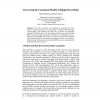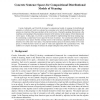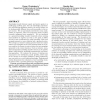100 search results - page 20 / 20 » On the Role of Preferences in Argumentation Frameworks |
ICCS
1997
Springer
13 years 11 months ago
1997
Springer
: The need for analysis and modeling of knowledge has been espoused by many researchers as a prerequisite to building knowledge based systems (KBS). This approach has done little t...
PERCOM
2006
ACM
14 years 7 months ago
2006
ACM
A smart home aims at building intelligence automation with a goal to provide its inhabitants with maximum possible comfort, minimize the resource consumption and thus overall cost...
CORR
2011
Springer
13 years 2 months ago
2011
Springer
Coecke, Sadrzadeh, and Clark [3] developed a compositional model of meaning for distributional semantics, in which each word in a sentence has a meaning vector and the distributio...
ATAL
2006
Springer
13 years 11 months ago
2006
Springer
Knowledge transfer between expert and novice agents is a challenging problem given that the knowledge representation and learning algorithms used by the novice learner can be fund...
ATAL
2010
Springer
13 years 8 months ago
2010
Springer
Coordination within decentralized agent groups frequently requires reaching global consensus, but typical hierarchical approaches to reaching such decisions can be complex, slow, ...



